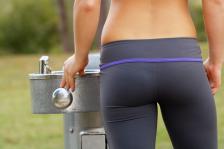How Much Should You Drink During Exercise?
Is there such thing as drinking too much or too little water during exercise? Should you take salt pills or electrolytes to replenish your supply?
Ben Greenfield
Listen
How Much Should You Drink During Exercise?

-
That you need to drink 8 glasses of water per day
-
That caffeinated beverages, such as coffee and tea, are dehydrating.
But what about during exercise? How much water should you drink when you’re working out? Do you need to drink water at all? And what about salt pills, sports drinks, or electrolytes? Do you need to take those too? You’ll find out the answers in this article.
Water Loss During Exercise
Water loss during exercise can be significant. To put this in proper context, I’ll tell you about a recent test I did to determine how much fluid I lost in sweat during exercise and how much salt was in that sweat.
For this test, which was overseen by a professional research team in a laboratory, I ran on a treadmill in a 95 degree room at my maximum exercise capacity for 45 minutes. I was weighed before and after the test, and even the towel I used to wipe sweat off my body was accounted for in the post-test weighing.
But that wasn’t all.
I was also required to record every morsel of food that I ate, and to collect all my urine during the 24 hour test period in a special jug. I was also hand-bathed in deionized water after the test, and that water was analyzed for sodium levels, which allowed researchers to find out exactly how much salt I was losing in my sweat. If you care to watch a video of the entire procedure, then see How Much Salt Do You Lose In Your Sweat?
Ultimately, the results revealed that I personally sweat over 2 liters of water per hour!
In a less hot climate, such as you might encounter when exercising at the gym, the average person sweats between 0.8 to 1.4 liters (about 27.4 to 47.3 ounces) per hour during exercise.
To help you visualize this amount, the average bike water bottle holds about 20-24 ounces of fluid. In my case, I would need to consume nearly 3 full water bottles per hour to stay fully hydrated (although the highest human sweat rate recorded is 5 liters, or 169 ounces, per hour).
I also discovered that I lose 2 grams of sodium per hour. This is just slightly below the current U.S. dietary recommendations for total daily sodium intake. The average person will lose between 1 and 3 grams of sodium per hour, although some athletes in hot conditions have been found to lose over 5 grams, which is the equivalent of about 5 cups of salted peanuts!
If you want to discover how much fluid you personally lose while exercising, you don’t have to do a lab test like me. Instead, you can simply:
-
Weigh yourself without any clothes one hour before exercising.
-
After an hour of exercise, strip down and weigh yourself again.
-
Assuming you did not go to the bathroom or drink any water during your exercise session, your total weight loss is your sweat rate.
-
For each kilogram of lost weight, you lost one liter of fluid. For each pound lost, you lost 15.4 ounces of fluid.
Of course, if you drink any fluids or water during the test, you’ll need to add the total weight of fluids consumed to the amount of weight you lost during the test.
How Much Water Should You Drink During Exercise?
So now that you know how much water you lose during exercise, the important question is: do you need to drink as much water as you’re losing?
The answer is a definitive no!
Here’s why: If you try to drink as much water as you’re losing during exercise, you’ll find yourself with an uncomfortable stomach or side ache from too much fluid in your gastrointestinal tract, you’ll spend the great majority of your workout with a water bottle held to your mouth, and you may even risk “water intoxication,” which results from drinking so much water that you dilute your blood (this phenomenon, called hyponatremia is actually a big problem in events such as the marathon or triathlon).
Instead, simply drink as much water as you need to drink to avoid 2-3% total body weight loss by the time you’re done working out. This means that in most cases, you don’t need to drink anything at all if your workout is one hour or less, and you can instead simply rehydrate when you’re finished exercising. For most people, proper hydration during exercise will require about 20-30 ounces of water per exercise for sessions lasting one hour or more.
You also don’t need to eat as much salt as you’re losing during exercise. Your kidneys have a special mechanism which can conserve sodium by causing you to lose less salt in your urine, and release more of your body’s storage sodium levels. That mechanism kicks in when you begin sweating and losing sodium, but actually won’t work quite as well if you’re eating salt pills or drinking sports drinks during your workout. If you want to get into the nitty-gritty details of both sodium and hydration replacement during exercise, then take a listen to: The Death of Gatorade – Should You Stop Using Electrolytes During Exercise? or read this paper in the British Journal of Sports Medicine.
If you have more questions about how much water you should drink while you exercise, share them in Comments or on the Get-Fit Guy Facebook page!
Water Fountain image courtesy of Shutterstock

